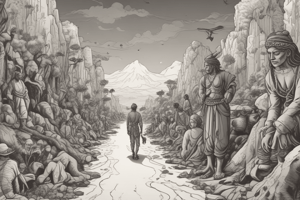Podcast
Questions and Answers
Which of the following best describes how culture can be maladaptive?
Which of the following best describes how culture can be maladaptive?
- It encourages cultural diversity and acceptance.
- It can endanger people's survival in the long run. (correct)
- It can enhance technological development.
- It fosters community engagement and support.
What is the process of adjusting to a new culture called?
What is the process of adjusting to a new culture called?
- Cultural diffusion
- Cultural assimilation
- Cultural adaptation (correct)
- Cultural evolution
What drives the changes in culture over time?
What drives the changes in culture over time?
- Diffusion, acculturation, technology, and globalization (correct)
- Isolation and self-sufficiency
- Tradition and heritage preservation
- Cultural stagnation
How does material culture impact nonmaterial culture?
How does material culture impact nonmaterial culture?
Which process involves adopting traits from another culture due to exposure?
Which process involves adopting traits from another culture due to exposure?
What is the main concept of culture as defined by Edward B. Tylor?
What is the main concept of culture as defined by Edward B. Tylor?
Which characteristic asserts that culture is acquired rather than innate?
Which characteristic asserts that culture is acquired rather than innate?
What does the concept of cultures being based on symbols imply?
What does the concept of cultures being based on symbols imply?
How are different elements of a culture generally perceived?
How are different elements of a culture generally perceived?
What lies at the core of cultural understanding according to the provided definitions?
What lies at the core of cultural understanding according to the provided definitions?
Which of these aspects is explicitly identified as part of culture?
Which of these aspects is explicitly identified as part of culture?
What does it mean when culture is referred to as 'integrated'?
What does it mean when culture is referred to as 'integrated'?
Which statement best describes 'enculturation'?
Which statement best describes 'enculturation'?
Flashcards are hidden until you start studying
Study Notes
Defining Culture
- The term "culture" originates from the Latin word "cultus," meaning "tilling," "cultivating," "refining," or "nurturing."
- Culture represents a collection of shared ideas, customs, beliefs, and knowledge acquired from others and passed down through generations.
- Edward B. Tylor defined culture as "That complex whole which includes knowledge, belief, art, morals, customs, and any other capabilities and habits acquired by man as a member of society."
- Clifford Geertz described culture as "A system of inherited conceptions expressed in symbolic forms by means of which men communicate, perpetuate, and develop their knowledge about and attitudes toward life."
- James Spradley defined culture as "The acquired knowledge people use to interpret experience and generate behavior."
Culture is a Way of Life
- Culture encompasses how people think and behave.
- It includes food, clothing, language, religion, and inherited societal values.
- Culture embodies our thoughts and actions, encompassing achievements in art, music, literature, architecture, sculpture, philosophy, religion, and science.
- It also includes customs, traditions, festivals, and perspectives on life.
Characteristics of Culture
- Culture is Learned: It is not innate and acquired through enculturation or socialization.
- Culture is Shared: Members of a group share a culture due to common upbringing, however, not all aspects of a culture are interconnected and some elements may be diametrically opposed.
- Culture is Based on Symbols: A symbol represents something else, and their meaning is arbitrary and dependent on cultural agreement.
- Culture is Integrated: All aspects of a culture are interrelated, though not all are seamlessly connected, and opposed elements may exist.
- Culture is Adaptive: It involves adjusting to new cultures, like learning a new language and phrases. However, not all aspects of a culture are adaptive, and some elements may be maladaptive, potentially endangering long-term survival.
- Culture is Dynamic and Ever-Changing: New objects introduced into material culture (physical objects, resources, and spaces) impact nonmaterial culture (nonphysical ideas about culture).
- Cultural Change Drivers:
- Diffusion: The spread of ideas, behaviors, or objects between cultures.
- Acculturation: The process of adopting and learning cultural traits from another group due to exposure to a new culture.
- Technology: Methods, systems, and devices derived from scientific knowledge used for practical purposes.
- Globalization: Interconnectedness of economies, cultures, and populations driven by trade, technology, migration, and media.
Studying That Suits You
Use AI to generate personalized quizzes and flashcards to suit your learning preferences.




